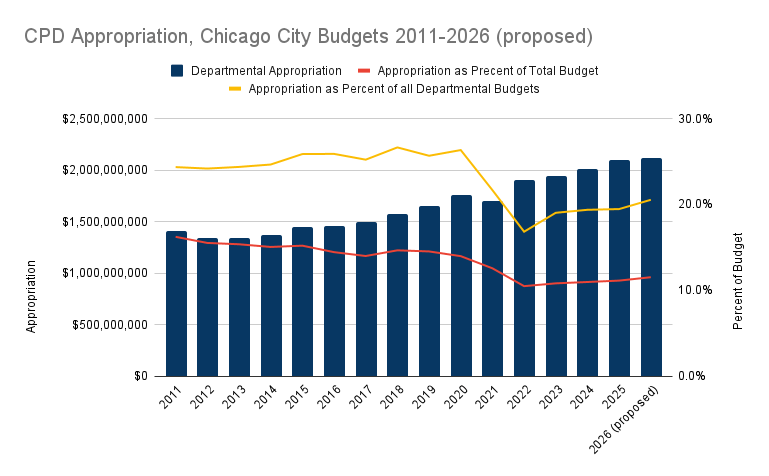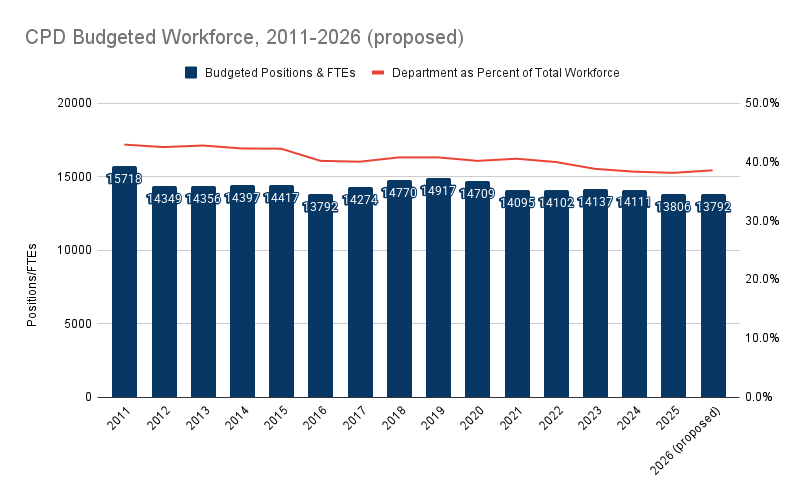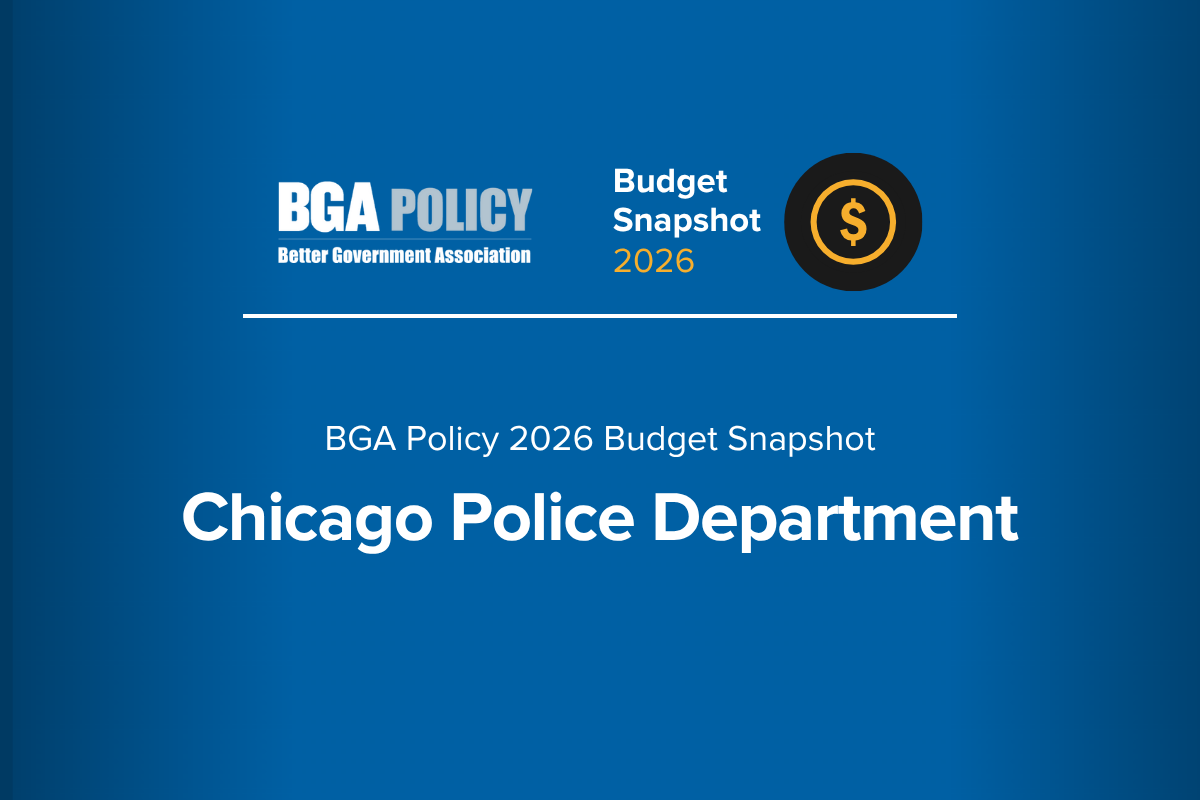The Chicago Police Department is by far the largest city department, in terms of both headcount and budgeted appropriations.
CPD positions make up 38.6% of the city’s total budgeted headcount in the 2026 budget proposal. The next-largest department, the Chicago Fire Department, is roughly one-third the size of CPD, with all other departments considerably smaller.
CPD appropriations make up 20.5% of all departmental budgets in the 2026 proposal. Looking at non-grant funds only, CPD makes up 31.4% of locally-funded departmental appropriations, and 50.5% of corporate funded departmental appropriations.
Departmental Highlights
Snapshot: Appropriation & Staffing Changes from 2025 Budget
- Over the past three complete budget years for which local fund actuals/encumbrances data is available, CPD was the only city department to consistently exceed its budget, by increasing amounts each year. CPD’s 2024 non-grant overspend of $188.1 million was on its own larger than the total non-grant budgets of 32 of the city’s 39 departments.
- The bulk of the overspend in 2022 came from legal settlements and judgments, while in 2023 and 2024 overspend was driven by both personnel services and court settlements.
- As a 2022 BGA Policy analysis highlighted, CPD has gone over its budget for legal settlements every year since at least 2011 with the exception of 2020, when courts were closed for much of the year due to the COVID-19 pandemic. The city council has already authorized CPD-related settlements exceeding the 2025 budget as well, with two months still remaining in the year, but the 2026 proposal does not change the CPD settlements appropriation from the same level it has been at since 2020.
- Because the appropriation categories used in the 2022-2024 actuals datasets from the Department of Finance do not correspond exactly to the appropriation accounts used in the budgets presented by the Office of Budget and Management, an exact line-by-line comparison of real spend to budget is not possible. However, a separate CPD overtime dataset and dashboard maintained by the Office of Inspector General showed overtime earnings well in excess of budget for CPD in 2023 ($324.4 million) and 2024 ($270.5 million), meaning that overtime likely made up the majority of the personnel services overspend.
- From Feb-Sept 2025, the months for which the city has published monthly vacancies data, 742 of CPD’s budgeted full-time positions were persistent vacancies (meaning that the same title/division/section/subsection combination was vacant for all eight months of available data).
- Persistent vacancies at CPD from Feb-Sept 2025 included all three of the department’s standalone, single-title divisions: the Urban Areas Security Initiative, violence against women/domestic violence protection, and response to domestic violence, sexual assault and stalking programs.
- Apart from the single-position special divisions, the DoJ-funded Community Oriented Policing Services hiring program and Office of Constitutional Policing and Reform had the highest rate of persistent vacancies, 37.3% and 23.6% respectively.
- Persistent vacancy rates at Patrol Services, the department’s largest division, were very low, with only 1.6% of budgeted full-time positions unfilled from Feb-Sept 2025.
- The titles with the most persistent vacancies were Police Officer, Police Officer Assigned as Detective, Training Officer, and Police Officer – Field Training Officer.
- Budgeted positions overall remained very consistent with the previous year, with a net -14 positions primarily driven by changes in the Office of Constitutional Policing and Reform.
- 21 Training Officer positions have been eliminated from the Office of Constitutional Policing and Reform, the largest change within a single title in the proposed CPD budget.
- The department is also down a net six Sergeant positions and four of the department’s five Coordinator of Research and Evaluation positions.
- Eleven new Assistant Director positions have been budgeted within the Office of Constitutional Policing and Reform, as well as six Police Officer Assigned as SWAT positions within the Bureau of Counter-Terrorism (the only Police Officer title to see a change in budgeted positions.)
- CPD’s overtime budget for 2026 is nearly double that of the previous year, up $101.1 million in the largest single-category increase. Most of the remainder of the department’s budget growth comes from salaries and wages and medical expenses outside of workman’s compensation, with relatively small increases in other categories.
- The department saw a -$5 million (-27.7%) decrease in outside contract spending from the professional and technical services appropriation account, as well as a -$2 million (-55.4%) decrease in police vehicle appropriations.
Historical Context
CPD’s share of the budget and departmental appropriations as a whole dropped during the height of pandemic-era funding, when massive infusions of COVID-19 relief funds were added to the public health department and other departments with temporary pandemic-response programming.
As pandemic relief funds expire, CPD’s share of the budget as a whole and of total departmental appropriations has begun to trend upwards once more.
From 2011-2025, CPD’s budgeted appropriations grew by an average annual increase of 3.5%, or 0.5% adjusted for inflation, compared to a citywide average rate of 8.3% (inflation-adjusted 4.4%).

Over the past three complete budget years for which local fund actuals/encumbrances data is available, CPD was the only city department to consistently exceed its budget, by increasing amounts each year. CPD’s 2024 non-grant overspend of $188.1 million was on its own larger than the total non-grant budgets of 32 of the city’s 39 departments.
CPD staffing levels have declined slowly over time since the most-recent high of 14,917 budgeted positions in 2019. From 2011-2025, CPD’s budgeted headcount declined at an average annual rate of -0.9%, compared to a citywide average annual change of -0.1%.

From February through September of 2025, the months for which the city released full-time position vacancy data, CPD averaged an 8.6% vacancy rate, compared to the citywide average of 11.2%.
742 of the department’s budgeted full-time positions were persistent vacancies, meaning that the same title/division/section/subsection combination was vacant for all eight months of available data.
Persistent vacancies at CPD from Feb-Sept 2025 included all three of the department’s standalone, single-title divisions: the Urban Areas Security Initiative, violence against women/domestic violence protection, and response to domestic violence, sexual assault and stalking programs.
Apart from the single-position special divisions, the COPS hiring program and Office of Constitutional Policing and Reform had the highest rate of persistent vacancies, 37.3% and 23.6% respectively.
Persistent vacancy rates at Patrol Services, the department’s largest division, were very low, with only 1.6% of budgeted full-time positions unfilled from Feb-Sept 2025.
CPD had at least one persistent vacancy from Feb-Sept 2025 in 65 different titles, with the most persistent vacancies in the Police Officer, Police Officer Assigned as Detective, Training Officer, and Police Officer – Field Training Officer positions.
Staffing
21 Training Officer positions have been eliminated from the Office of Constitutional Policing and Reform, the largest change within a single title in the proposed CPD budget. The department is also down a net six Sergeant positions and four of the department’s five Coordinator of Research and Evaluation positions.
Eleven new Assistant Director positions have been budgeted within the Office of Constitutional Policing and Reform, as well as six Police Officer Assigned as SWAT positions within the Bureau of Counter-Terrorism (the only specific Police Officer role to see a change in budgeted positions.)
Appropriations
CPD is 95.9% locally-funded in this year’s budget proposal, up slightly from the previous year’s 89.9%.
92.5% of the department’s appropriations are funded from the Corporate Fund. Federal grant funded appropriations have declined significantly, down -$115.7 million (-68%) from the previous year’s budget.
Largest Appropriations
As in previous years, personnel expenses make up the vast majority of CPD’s budget, with salaries and wages the largest single appropriations category by far. Overtime is the next-largest category, having nearly doubled from the previous year’s appropriations.
Funds for legal settlements and judgments is the department’s third-largest appropriation, despite having remained unchanged from the previous year. As a 2022 BGA Policy analysis highlighted, CPD has gone over its budget for legal settlements every year except for 2020, when courts were closed for much of the year due to the COVID-19 pandemic. The city council has already authorized CPD-related settlements exceeding the 2025 budget as well, with two months still remaining in the year.
As a predominantly locally-funded department, CPD’s local fund actuals and encumbrances are a relatively reliable point of comparison to its budgeted appropriations. CPD has exceeded its non-grant budget by increasing amounts every year in the past three complete budget years for which actuals are available.
The bulk of the overspend in 2022 came entirely from legal settlements and judgments, while in 2023 and 2024 overspend was driven by both personnel services and court settlements.
Because the appropriation categories used in the 2022-2024 actuals datasets from the Department of Finance do not correspond exactly to the appropriation accounts used in the budgets presented by the Office of Budget and Management, an exact line-by-line comparison of real spend to budget is not possible.
However, a separate CPD overtime dataset and dashboard maintained by the Office of Inspector General showed overtime earnings well in excess of budget for CPD in 2023 ($324.4 million) and 2024 ($270.5 million), meaning that overtime likely made up the majority of the personnel services overspend.
In 2024 specifically, the most recent year for which full-year actuals data is available, CPD spent only 55.4% of its budgeted Consent Decree appropriation.
Change from Previous Year
CPD’s overtime budget for 2026 is nearly double that of the previous year, up $101.1 million in the largest single-category increase.
Most of the remainder of the department’s budget growth comes from salaries and wages and medical expenses outside of workman’s compensation, with relatively small increases in other categories.
The department saw a -$5 million (-27.7%) decrease in outside contract spending from the professional and technical services appropriation account, as well as a -$2 million (-55.4%) decrease in police vehicle appropriations.
Related


